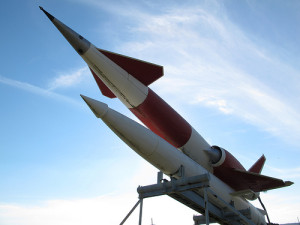Russia Aims Nukes at Denmark
The Danish government has announced that it is considering becoming part of NATO’s controversial missile defense program. NATO touts its defense shield as a protective measure against ballistic missiles from states like Iran. Russia has long argued that the program threatens its capabilities for nuclear deterrence , which it deems essential to its security apparatus. Between 2007 and 2008, NATO announced intentions to establish missile defense bases in Poland and the Czech Republic, leading to a near-meltdown in NATO-Russia relations. Currently, the missile defense system is based in the Mediterranean Sea with some European countries giving radar-capacity aid. Denmark’s entry would expand the NATO system. Although NATO has consistently denied accusations that the missile defense system threatens Russia, Russia has warned that this could cause relations to deteriorate again.

During the 2007-2008 showdown, Russia announced that it would cease observing the Conventional Forces in Europe (CFE) Treaty, which has regulated the deployment of military forces in Europe since the end of the Cold War, and threatened to cut off relations with NATO. Vladimir Putin, in his capacity as Prime Minister, warned that long-range missile defense in Poland and the Czech Republic would lead to a “new arms race” in Europe. This led the Obama administration to secure a compromise with Russia in 2009 that called off long-range defense in Poland and the Czech Republic in exchange for more medium and short-range missile defense architectures. This development started the “Reset” in US/NATO-Russia relations that all but fell apart by the end of President Obama’s first term.
Russia threatened to aim some of its nuclear weapons at Denmark if the NATO member joined the missile defense infrastructure. These comments come amid a deterioration in NATO-Russia relations since the start of the Ukrainian conflict. Nonetheless, Russia has found the program controversial since 2009, and has continuously argued that NATO’s missile shield could neutralize its nuclear deterrent,putting it at a strategic disadvantage in the case of a Russia-NATO confrontation. Denmark’s recent interest in participating in the missile shield is indicative of the heightened security scenario in Europe. Since February 2014, Russia has increased the amount of bombers flying over Europe, submarines have been spotted eerily close to Sweden, a war has developed in Ukraine, and NATO has increased its presence in Eastern Europe. Denmark’s accession to the missile defense program would be another military escalation in the continent that would add to the growing buildup in Europe.
The Danish government clarified that it was not placing anti-missile systems in its European territory, though missiles themselves could be installed in Greenland (an autonomous country of the Kingdom of Denmark, similar to the Faroe Islands). This would be significant given Russia’s recent military exercises in the Arctic. The drills were unprecedented in size, signaling the increasing importance of the Arctic region to global security as global temperatures rise and ice caps melt. Placing anti-ballistic missiles in Greenland would extend NATO’s defense capabilities vis-à-vis the Arctic region, but also spur Russia to fortify its own military armaments.
In conclusion , NATO’s missile defense program makes Russia feel insecure in that its nuclear deterrent is not guaranteed, thereby resulting in a classic security dilemma. One can believe that NATO is not aiming to fight Russia proper, however Moscow does not believe that it can assure peaceful relations with NATO for eternity – especially if the Alliance continues to tout the eventual membership of more former Soviet states. . This situation reflects the current security atmosphere in Europe: neither NATO nor Russia feel secure in their current environment, but instead of scaling down, they are ramping up.
Recently, Russia moved some of its nuclear arsenal to Kaliningrad - bringing it much closer to NATO’s border. Menacing Denmark with nuclear weapons is an indicator of how seriously Moscow takes NATO’s missile defense program and a testament to how low relations between the Atlantic alliance and Russia have sunk since the 2009 “Reset”.

